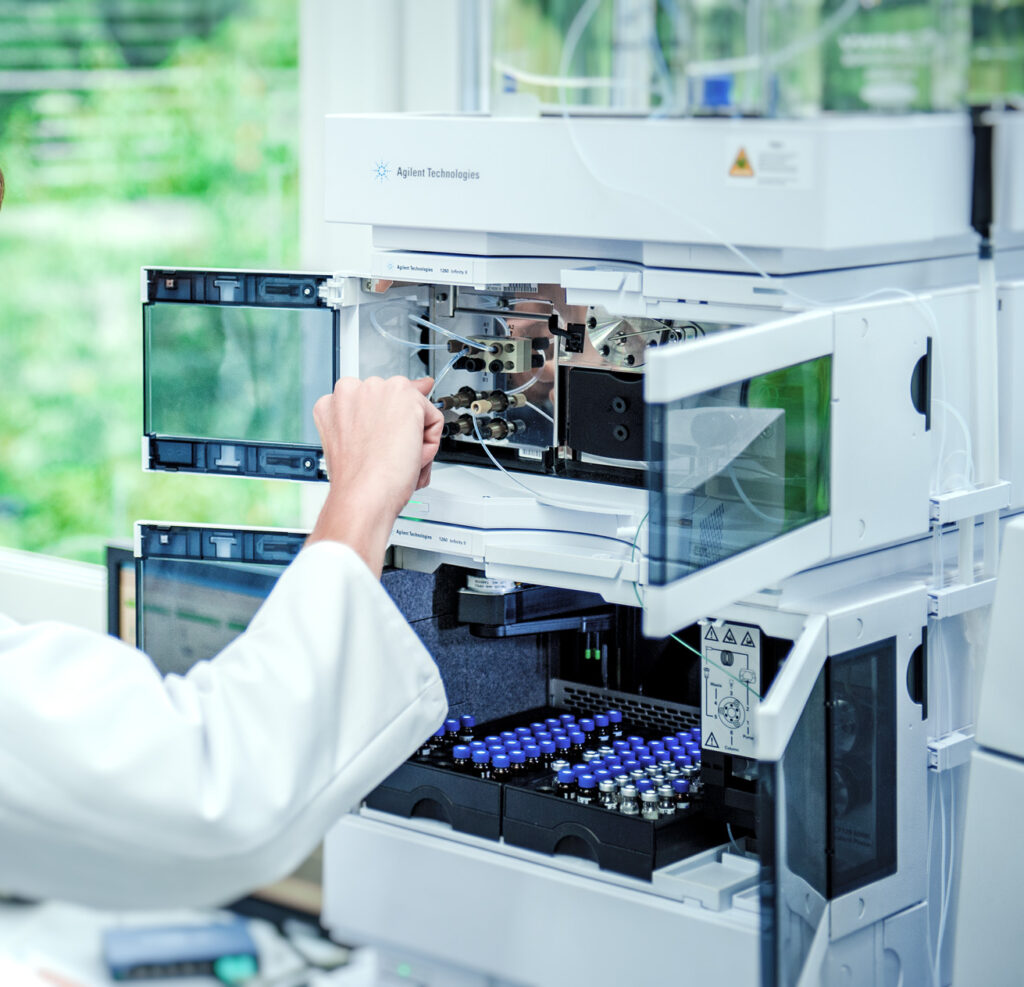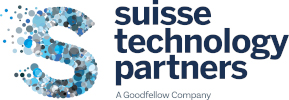CHROMATOGRAPHY
Chromatography in chemistry and pharmaceuticals:
Separation and analysis of mixtures of substances
Chromatography is an important separation method in chemistry and the pharmaceutical industry that makes it possible to separate and identify different components of a mixture. The method is based on the different distribution of components between a stationary and a mobile phase flowing through a column. Chromatography is used in chemistry to identify, purify or quantify substances, for example. In the pharmaceutical industry, chromatography is an important part of the quality control process for drugs. It enables precise analysis of active ingredients, excipients and impurities as well as monitoring the stability and shelf life of medicines. Chromatography is therefore an indispensable tool in the chemical and pharmaceutical industries and has contributed to many important advances in these areas.

Chromatographic methods at Suisse TP
Examination method
- Content and purity determinations using liquid and gas chromatography
- Use and evaluation via Empower and GCMSsolution software
Device type and equipment
- Agilent: HPLC’s 1200 Series with DAD and RI detectors
- Agilent GC-FID with Direct Injection and Headspace
- Shimadzu GCMS-QP2020 with Direct Injection and Headspace
Functional principle
Chromatographic processes allow the separation of mixtures of substances through the different distribution of individual components between a mobile and a stationary phase. If the mobile phase is a liquid, it is referred to as liquid chromatography (LC); if it is gaseous, it is referred to as gas chromatography (GC).
After separating a mixture of substances, the individual substances are measured using different detectors (MS, DAD, RI) and evaluated qualitatively or quantitatively using various calibration methods.
Typical applications
Determination of content and purity, determination of residual solvents in pharmaceutical products, liquids and solids
Norms and standards
Various chapters and monographs from EP and USP and other standards
Method development and validation in chromatography
Compliance with strict regulatory requirements by GMP-certified independent laboratory
As a GMP certified independent laboratory, we have extensive experience and expertise in method development and validation. The development and validation of chromatography methods is a crucial step in chemical analysis and especially in the pharmaceutical industry to achieve accurate and reliable results.
Method development involves identifying the best separation procedure and the appropriate conditions to enable analysis of the target compound. Factors such as the choice of stationary phase material, the choice of mobile phase, the flow rate and the injection volume can affect the results and must be carefully optimized.
Another important aspect is method validation to ensure that the method provides accurate and reliable results. This includes checking the linearity, precision, selectivity and sensitivity of the method. Validation must be carried out in compliance with strict regulatory requirements to ensure that the method is fit for purpose.
In addition to the development and validation of methods, strict quality controls must also be carried out to ensure that the results are consistent and reproducible. Thorough documentation of all steps in the development and validation process is also essential to ensure the traceability of results.
Overall, method development and validation is a critical step in chemical analysis and in the pharmaceutical industry to achieve accurate and reliable results and to ensure that all regulatory requirements are met. As a GMP-certified independent laboratory, we are able to perform these steps carefully and professionally to ensure the highest quality and accuracy for our customers.
Basic principles of chromatography
Various separation methods
Chromatography is a physical separation process based on the differential distribution of components between a stationary and a mobile phase. The stationary phase is usually a solid or liquid material that is deposited in a column or on a surface, while the mobile phase is a liquid or gas that flows through the stationary phase. During separation, the components to be separated interact with the stationary phase in different ways and are thus retained to varying degrees, resulting in separation of the mixture.
There are different types of chromatography, including gas chromatography (GC), liquid chromatography (LC) and thin layer chromatography (TLC). GC separates volatile compounds based on their different distribution between a gas phase and a stationary phase. LC, on the other hand, uses a liquid stationary phase to separate a variety of compounds. In TLC, a thin layer of stationary material is deposited on a flat surface to enable rapid separation of compounds.
The choice of chromatography method depends on the type of material to be separated and the requirements of the analysis. Chromatography is a powerful tool for the separation, identification and quantification of mixtures of substances in the chemical and pharmaceutical industries.
Applications of chromatography
Analysis of pharmaceuticals, food and environmental samples
Chromatography is a versatile separation process that is used in many areas of chemistry and the pharmaceutical industry. One important application is the analysis of pharmaceuticals, where chromatography is used to identify, quantify and purify active ingredients and impurities. Chromatography is also used in the food industry for the analysis of flavorings, colorants and preservatives to ensure the quality and safety of food. In environmental analysis, chromatography is used to identify and quantify pollutants in soil, water and air.
In research, chromatography is used to isolate and purify natural substances, proteins and other biological compounds. In addition, chromatography is used in chemistry to monitor and improve the purity of reaction products.
Chromatography is also an important part of forensic analysis, where it is used to identify drugs, poisons and other substances.
Overall, chromatography is an important tool in chemical analysis and in the quality control of products in the pharmaceutical and other industries. By using different chromatography methods, complex mixtures can be effectively separated and analyzed, leading to a better understanding of chemical processes and product improvement.
Precision and expertise
The right choice of a reliable partner for chromatography analyses is important!
In summary, chromatography is an essential tool in chemical analysis and especially in the pharmaceutical industry. Careful method development and validation is essential to achieve accurate and reliable results and to ensure that all regulatory requirements are met.
As a GMP-certified independent laboratory, we have the expertise and experience to handle all aspects of chromatography, including method development, validation and quality control.
In the future, chromatography is expected to become even more widely used as the importance of quality control and traceability continues to increase. New technologies and methods are also being developed to improve the efficiency and accuracy of chromatography.
As an independent laboratory with experienced staff, we are the ideal partner for customers who require precise and reliable chromatography analysis. We are committed to maintaining the highest standards in method development and validation to provide our customers with the best possible results.




